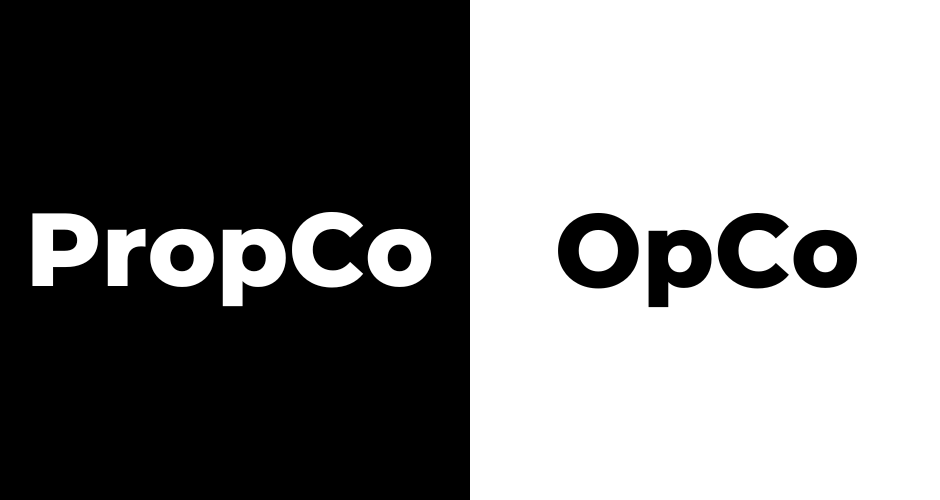PropCo & OpCo – How are they different?

In the world of business and finance, the OpCo/PropCo model stands as a unique strategy, yet are often overlooked by individuals and businesses as a financially advantageous way of funding a property purchase. But what do these terms mean and how are they different?
We will unravel these concepts, exploring the distinct roles they play within a business and specifically, how they work in the world of property finance.
‘OpCo’ and ‘PropCo’ might sound like financial jargon, but they have profound implications for how businesses operate and manage assets. Whether you’re a business owner, a property developer, an investor, or simply curious, understanding the OpCo and PropCo structure can provide valuable insights into the workings of businesses and the financial strategies they employ. So, without further ado, let’s dive in and dissect these terms in the context of the UK property market.
OpCo
This stands for “Operating Company”. In the context of a business, the OpCo is the part of the business that is involved in the day-to-day operations, producing goods or services. For instance, if we’re talking about a hotel, the OpCo would be responsible for running the hotel — managing the staff, serving customers, maintaining the facilities, etc but would not own the building.
PropCo
This stands for “Property Company”. The PropCo owns and manages the property/real estate assets of the business. Using the same hotel example, the PropCo would own the physical building of the hotel and the land it sits on – not the OpCo.
Usually, these two entities are separated for various reasons such as financial benefits, liability protection (particularly if the OpCo is in financial difficulty that could lead to a claim by creditors) and operational flexibility. The OpCo would typically pay rent to the PropCo for use of the property.
For example:
A printing firm business based in Handbridge, Chester, let’s call them ABC Print, may want to buy the building they have been trading from for the last 10 years. Rather than buy the building in their company name, ABC Print Limited and have the property form part of their company balance sheet, they decide to set up a new SPV called ABC Property Limited (this is thePropCo) and buy the property through that company using a bridging loan or even a commercial mortgage. Then, ABC Print Limited will ‘rent’ the property back from ABC Property Limited and be classed as a tenant, even though both companies probably have the same shareholders and are in effect the same firm.
Let’s gointo a little more detail as to the benefits of this lending structure.
Risk Management
By separating the operational business (OpCo) from the property-owning company (PropCo), companies can limit liability. If the OpCo faces financial difficulty or legal issues, the PropCo’s assets are generally safe and vice versa.
Financial Flexibility
This structure can potentially make it easier for the OpCo to raise funds. Investors or lenders may be more willing to invest in or lend to the OpCo knowing that the risk associated with the property itself is held separately.
Tax Efficiency
Depending on the jurisdiction, there may be tax benefits to separating the operational and property assets. For example, the OpCo can deduct rent payments to the PropCo as a business expense.
Capital Release
The PropCo could potentially sell the property and lease it back to the OpCo, freeing up capital for the business to reinvest.
Now, let’s consider a trading business that’s looking to buy the property they trade from, which is one of the most common resons for setting up this structure in the UK.
This business might consider an OpCo/PropCo structure for the following reasons:
-
Asset Protection: By owning the property through the PropCo, the business can protect this asset from operational risks associated with the trading business (the OpCo). Should the OpCo stop trading, go into administration or become liquidated, then the property asset (in the PropCo) is protected as this will not form part of any claim on the OpCo.
-
Balance Sheet Optimisation: The value of the property is held on the PropCo’s balance sheet, potentially improving the financial metrics of the OpCo.
-
Potential for Property Appreciation: Over time, the property may appreciate in value, providing a return on investment to the owners. This appreciation is separate from the operational profits of the trading business.
It’s worth noting that while there can be benefits to an OpCo/PropCo structure, there are also potential downsides and complexities. These can include the costs and administrative burden of maintaining two separate legal entities, potential conflicts of interest between the OpCo and PropCo and the potential for increased regulatory scrutiny.
Therefore, businesses should carefully consider these factors and seek professional advice before implementing an OpCo/PropCo structure.
Please call us on 01244 565095 and we ill be happy to advise you how it works in practice and how we can help fund the property purchase.

